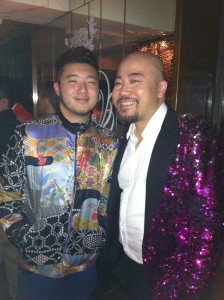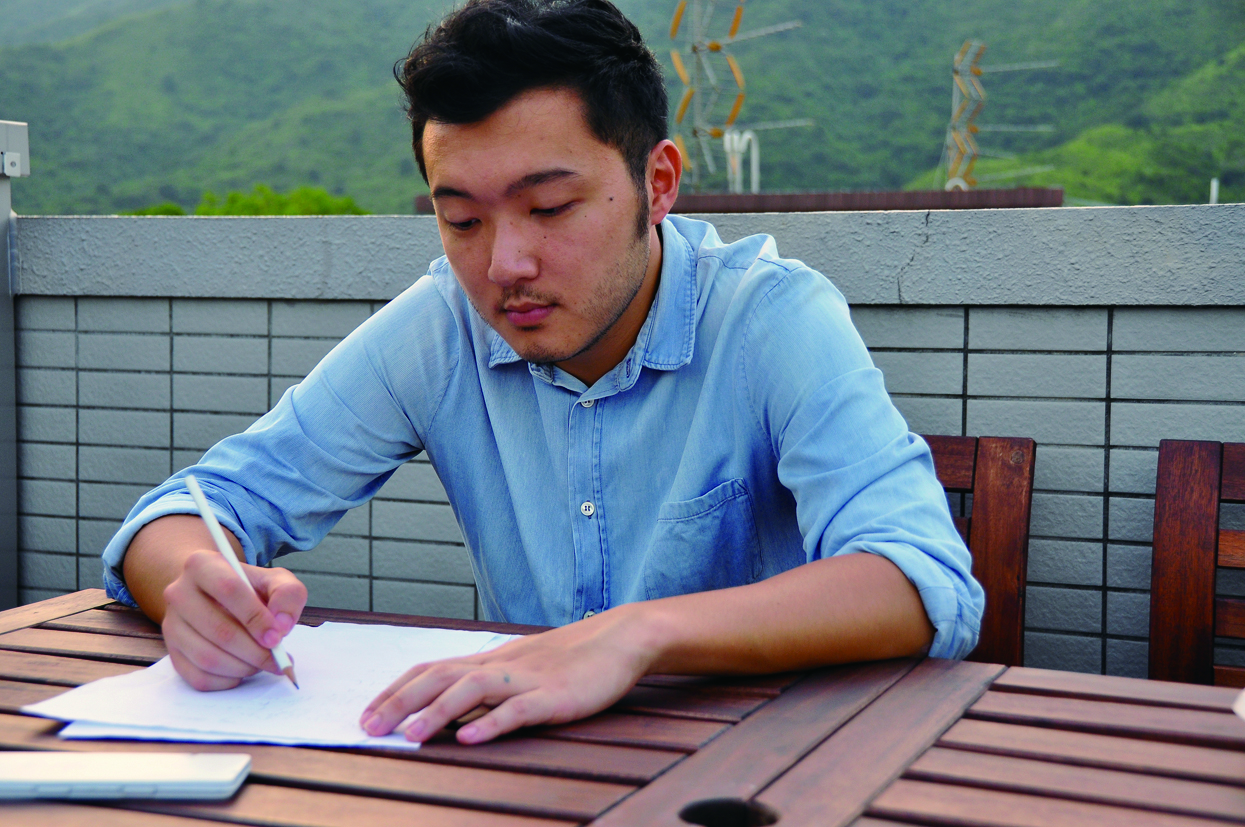Lyricist Chan Wing-him stays hopeful and lives life his own way
by Macau Mak
On New Year’s Day this year, while others were making their new year’s resolutions, musicians dressed in glitzy brands attended the Ultimate Song Chart Awards Presentation, waiting to learn how the pop industry’s year-end “report cards” would be distributed. It was a night on which the same familiar faces claimed their designated prizes, until it came to the Best Lyricist Award.
For 18 years, the prize had alternated between Lin Xi and Wyman Wong Wai-man but this year, a young man broke the dominance of the duopoly. To thundering applause, 27-year-old Chan Wing-him stepped up to receive the golden trophy with shaking hands.
Chan has written Chinese lyrics for nine years and worked with stars such as Eason Chan Yik-shun, Hacken Lee Hak-kan and Pakho Chau Pak-ho, to produce notable hits, including Swipe Card (碌卡), Sky Lantern (孔明燈) and My Vow (我的宣言). The prize was like a vindication – Chan was glad he had kept up with lyric writing because he had a track record of easily giving up halfway in childhood and adolescence.

In primary school, Chan had a greater interest in mathematics than music and was once a member of the Hong Kong team for the Mathematics Olympiad. However, the mischievous boy was dismissed from the team after being caught sticking joke memos about teachers in the staff room and using school trophies to make a robot. Explaining why this episode ended his interest in maths, Chan says, “When I was small, I was rebellious. [I thought] if you give up on me, I’ll give up on you.”
Upon entering secondary school, Chan developed an interest in singing. Nevertheless, he disliked training in the school choir because it only practised a few songs for competition. “I think using music for competition is the most disgusting thing to do,” says Chan. Instead, he joined the Hong Kong Children’s Choir because it focuses on performance.
Chan’s studies went well until he was in Form Six. That year, he formed a group with his friends and ran for the students’ union election. Despite being the only choice on the ballot paper, they lost due to Chan’s notoriety in the school. Chan says that, at that time, some of his football companions used to bully the younger kids and he was tarred with the same brush. As a result, Chan’s group received a significant number of no confidence votes. He felt ashamed and played truant for nearly two months.
Although he later resumed his studies, he gave up on preparing for the Hong Kong Advanced Level Examination (HKALE). Instead he chose to concentrate on debate training and won the title of Best Debater in a territory-wide competition. Eventually, Chan got disappointing grades in the HKALE.
After completing secondary school, Chan worked as a script writer for radio ads at Commercial Radio. However, he soon realised there was little room for career development in the post and that new media would soon replace radio. He thought he could not get by forever just on his quick wit. So he sought a more down-to-earth approach for self-improvement through studying.
He quit his job after six months and enrolled first at the at the School of Professional and Continuing Education of Hong Kong University (HKU), and then the Music Department of the University of Hong Kong. However, Chan found he was not like most of his classmates who planned to transfer to the Business School or become teachers and live a stable life. Without completing his degree, he dropped out of university in 2009.

Shortly after leaving university, he received an invitation from Wyman Wong Wai-Man to become a full-time lyricist in 2010, but by then he had already been writing songs on the side for a number of years.
It started in 2005, when he was still at secondary school and was in the same choir as a cousin of the composer and singer Jerald Chan, of the pop duo Swing. Jerald Chan needed a lyricist to write lines for the song he had composed for the veteran singer Lee Lung-kei and the actress-singer Tiffany Lee Lung-yee. Jerald Chan’s cousin had spotted Chan’s talent for writing lyrics in the choir because the schoolboy often replaced the lyrics of foreign language songs with Chinese ones for fun. So he recommended the young Chan to the musician and he started his career as a part-time lyricist.
Chan explains that becoming a lyricist depends as much on connections in the industry as it does on talent. This is because the music labels or producers will choose a lyricist after selecting a catchy melody from a pool of songs sent by composers.
“How could I become their choice as a ‘no one’?” says Chan, recalling those early days. He did not receive a lot of job opportunities and would write two to three songs per year as a part-time lyricist. “I didn’t mind knocking on the door, but I didn’t even know where the door was,” Chan says. .
The turning point of Chan’s journey as a lyricist came in 2009. At that time, Swing planned to reenter the music scene. Chan wrote the lyrics of their first plug, I have stocks (我有貨), and it did well in various song charts. As a result of this, Chan got the opportunity to write lyrics for notable singers such as Eason Chan Yik-shun and Karen Mok Man-wai. In 2010, Wyman Wong Wai-man invited Chan to join “Shoot the Lyricist”, a group founded by Wong to share the writing opportunities with lesser-known lyricists. He became a full-time lyricist afterwards.
The local lyrics writing scene is still dominated by the duopoly of Wong and Lin Xi but Chan says this is fair because their works are truly outstanding. Facing such greats, Chan has adopted the motto, “Work until your idols become your rivals”. “I’ll lead the industry in the future, so I need to have such mentality.”
In the past, the urge to prove he was more competent than other lyricists exerted a lot of pressure on Chan and was counter-productive. At the time, he found he could not even write a word, because he was struggling to find unique writing styles and new expressions.
Fortunately, he overcame this block when he realised that frankness is the most important thing in writing lyrics. He then wrote from genuine feeling and included things that really touched him.

Chan wants to encourage listeners to reflect on meaningful issues. For example, society constantly emphasises how important it is for individuals to get “an edge at the starting line”. For Chan, that implies that people are all competing on a single track. Chan refutes this idea in the lyrics of Keep Going (自由意志). “I don’t think life is a competition. As long as you are walking on a path that you feel comfortable with, it works,” he says.
Chan prefers writing inspirational songs, like Keep Going, to love songs, even though these are usually more popular. He wants listeners to feel hope after listening to his songs. “If you have hope in the face of adversity, you’ll still live well,” he says.
He is rather pessimistic about Hong Kong’s overall situation in the future, but he wants people to have hope. He conveys this message in Sail On (同舟之情) which was the theme song of the government’s 2013 campaign “Hong Kong: Our Home”. He says the song does not come down on any political side, but suggests Hong Kong people should should be optimistic about the future.
Chan says he respects lyricists, like Adrian Chow Pok-yin and Lin Xi who often write articles critical of the political situation. But he makes it clear he is not as politically conscious as them. “I wouldn’t pretend to be radical. I’m not,” he says. “There are things we don’t want to happen now, but will they really turn out to be as bad as we thought they were years from now? Are the things we want to retain now, things that we’ll still really want to keep after many years? No one knows.”
Chan prefers to adapt to the circumstances no matter how the situation changes. “I believe I can still search for happiness under different circumstances, and this is the ultimate goal of human beings,” says Chan.
He believes writing lyrics helps him to have a conversation with himself and to gain self-knowledge. He thinks his words will become the traces of the life he leaves behind in this world when he passes away. “The speed of the world is too fast, and it’s easy for us to forget who we are actually and what we want,” says Chan.
Having been disobedient in the first 20 years of his life, Chan has now settled into his lyric-writing career. “No regrets. [But being impetuous] really has a consequence. Originally, I could have walked on an easier path but I’m forced to dance on a tightrope now,” he jokes.
The former mischievous troublemaker says he wants to continue to inspire listeners through his lyrics. “When I was small, the source of happiness was to take. But now it’s to give,” he says.
Edited by Vanessa Cheung











































